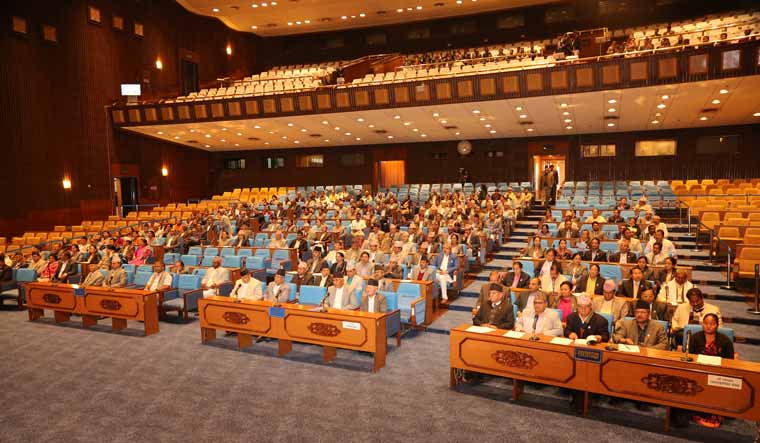Nepal’s House of Representatives on Tuesday unanimously approved a proposal to discuss a constitutional amendment bill that would make official a new map of the country, which includes territories disputed with India.
The map includes Lipulekh, Kalapani and Limpiyadhura under Nepal's depicted political and administrative regions, sparking contention in India which disputes these areas.
The ruling Nepal Communist Party as well as the opposition Nepali Congress and Madhesi-base parties all backed the tabling of the constitutional amendment bill, which was tabled by the Minister for Law, Justice and Parliamentary Affairs Shivamaya Thumbhangphe, and will amend the Nepali Constitution to reflect the new borders.
As reported by Republica, an English-daily, a discussion took place on the bill, with the opposition NC Chief Whip Bal Krishna Khand saying the party had decided to vote in favour of the bill, while a lawmaker from the mostly Madhesi-base Janata Samajbadi Party (JSP), Rajendra Shrestha, also said that his party would stand for the sovereignty and territorial integrity of the country.
The bill must now be approved by the house, which has 72 hours to make amendments, and requries a two-thirds majority in both houses in order to pass.
When the revised map was first released, the Indian Ministry of External Affairs reacted angrily, calling it a “unilateral act...not based on historical facts and evidence”, adding that an “artificial enlargement” of territorial claims would not be acceptable, asking Nepal to refrain from such "unjustified cartographic assertion".
The spokesman of the Ministry of External Affairs also asked Nepal to respect India's sovereignty and territorial integrity, hoping that the Nepalese leadership will create a positive atmosphere for diplomatic dialogue to resolve the outstanding boundary issues.
The vote in parliament came on the same day that the country’s Deputy Prime Minister and Defence Minister Ishwar Pokhrel said that the issue would be solved through dialogue and that there was no sense in deploying the army to Nepal’s borders.
“We will solve the border issue through dialogue with India, it is our consistent point. There is no sense in deploying the Army,” Pokhrel was quoted as saying by ANI.
The bill had earned nationwide support from across political lines.
Strained ties
 A protester in Nepal with a sign against India's claim of the disputed territories | Reuters
A protester in Nepal with a sign against India's claim of the disputed territories | Reuters
The Lipulekh pass is a far western point near Kalapani, a disputed border area between Nepal and India. Both India and Nepal claim Kalapani as an integral part of their territory—India as part of Uttarakhand's Pithoragarh district and Nepal as part of Dharchula district. The Nepalese claims against the Indian maps were that, according to the Sugauli treaty between Nepal and British India in 1815, the Mahakali River that runs through the Kalapani area was the boundary between the two countries. The region lies close to a geographically significant tri-junction with China (Tibet), and the Indo-Tibetan Border Police has marked its presence in the region.
The ties between the two countries came under strain after Defence Minister Rajnath Singh inaugurated a 80-km-long strategically crucial road connecting the Lipulekh pass with Dharchula in Uttarakhand on May 8.
Nepal reacted sharply to the inauguration of the road claiming that it passed through Nepalese territory. India rejected the claim asserting that the road lies completely within its territory.
Foreign Minister Pradeep Gyawali said on Tuesday that Nepal was still waiting for a response from India on holding talks to resolve the border dispute. We have expressed time and again that Nepal wants to sit at the table to resolve this problem, Gyawali told The Associated Press.
He said that requests to talk were made in November and December last year, and again in May.
Gyawali last month said that he was confident that the Kalapani issue between the two neighbours would be resolved through talks.
"We have always said that the only way to resolve this issue is by negotiating in good faith. Without impulse or unnecessary excitement, and without prejudice, Nepal wants to resolve the border issues via dialogues, Gyawali told Republica, an English daily.
"We are confident that this issue will be resolved via bilateral talks," he added. He, however, did not mention Limpiyadhura or Lipulekh—the two areas Nepal claimed belonged to it.
Responding to a question, he said, "We have been trying to hold talks in the matter. However, formal talks and conversations have not taken place yet.”
"We are hopeful that our formal and informal channels of communication will yield something positive," he added. Gyawali expressed the view that "the Indian side is also deeply concerned and feels the responsibility to address the issue.
The Constitution amendment proposal was to be tabled in Parliament last month but it could not proceed further after Prime Minister K. P. Sharma Oli said that he wanted to hold an all-party meeting to discuss the matter.
With inputs from PTI



